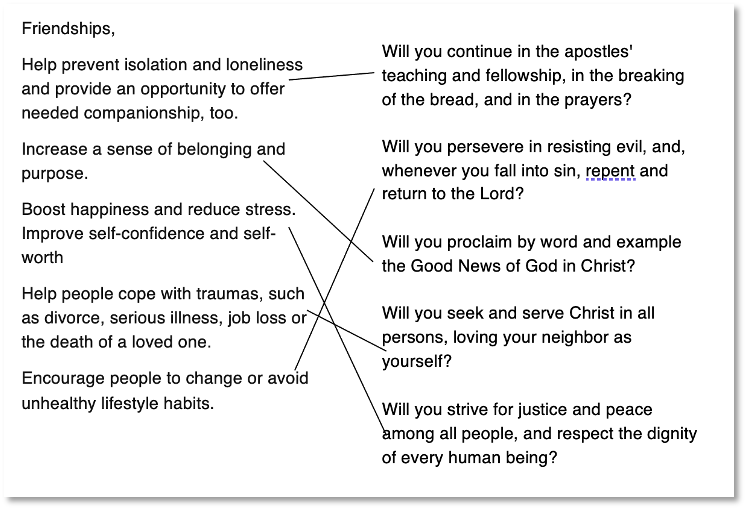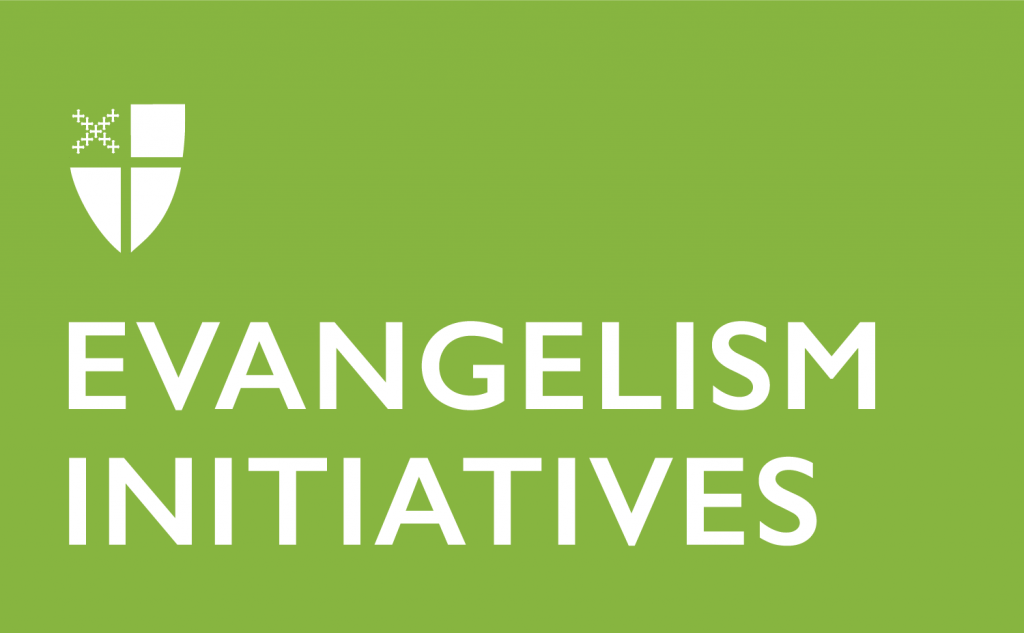Do Friendships Matter?
“Teacher, which commandment in the law is the greatest?” He said to him, “‘You shall love the Lord your God with all your heart, and with all your soul, and with all your mind.’ This is the greatest and first commandment. And a second is like it: ‘You shall love your neighbor as yourself.’ On these two commandments hang all the law and the prophets.” – Matthew 22:36-40
Imagine several rows of people—just ordinary people, with regular, complicated lives. Imagine on each row: folks are standing shoulder to shoulder, all facing the same direction. Their focus is jointly secured toward one central point in the room. As you look about the room, you notice that these people all seem relatively happy to be together, and on the few occasions when they break from their rows to move about—to come and go— they are polite, kind, friendly, even. They appear to know each other.
But are they friends?
Are they vessels of God’s love in each other’s lives?
And if not, does it matter for the Kingdom of God?
Recently I shared an article from ChurchLeaders.com with our Episcopal Evangelism Catalyst FB group (if you haven’t joined, we would love to have you). The article, “The Lonely Crowd: Churches Dying Due to Friendlessness,” seemed to strike a chord with folks—both in our group and in other places where it was posted. If you haven’t yet read the article, I hope you will, but the long and the short of was summed up well in a comment by evangelist catalyst Molly Wills Carnes, who wrote, “People aren’t looking for friendly churches. They are looking for friends.”
The part of me that grew up under a different expression of Christianity bristled slightly at the implication that being friends is somehow essential to the mission of the church. Don’t we have bigger fish to fry? Like saving all of humanity and the earth we inhabit? Surely, being friends isn’t that crucial?
But then I thought about the words and life of Jesus. I thought about how the only time we see Jesus weep is over losing a friend. The most significant transformations during his ministry are not to governments or institutions but in the lives of his friends— those he walked, talked, lived, and ministered with, shoulder to shoulder, and face to face. In John 15:12, Jesus says, “No one has greater love than this, to lay down one’s life for one’s friend.”
The verse does not read, “No one has greater love than this, to change policy.” Or “No one has greater love than this, to protect their institution.” Nope. What Jesus seems most concerned about at this moment, and throughout his life, is that we—all of us— learn to love each other. That we are in relationships with each other. That we are friends. And then, and only then, out of this love and these friendships can we indeed affect change and topple empires.
So, what does this mean for the work of evangelism?
In his book, “Visions of Vocation,” Steven Garber writes:
“Human beings cannot deny the need for friendship, the need for belonging. When we are disconnected from people and place, we lose something crucial to our humanity. We must learn to live incarnationally, committed to a particular people and particular places. If we are to have honest lives, we will have to Incarnate who we are and what we believe those people and in those places.”
I think what Garber is writing about goes straight back to Jesus’ commandment to love God and love one another. These aren’t just arbitrary commands given to stroke the ego of the Divine and keep us busy being friendly and polite. They are the key ingredients of life. They are the path to true flourishing and wholeness—for humans and all creation.
Even science backs up the concept that having friends matters. A Mayo Clinic article entitled “Friendships: Enrich your life and improve your health” discusses how “good friends are good for your health.” The article notes that good friendships “help prevent isolation and loneliness and give you a chance to offer needed companionship, too. Friends play a significant role in promoting your overall health. Adults with strong social connections have a reduced risk of many significant health problems, including depression and high blood pressure. Studies”
Reading through some of their examples of how friends can affect an individual’s overall wellness, I couldn’t help but draw some connections between living into our baptismal promises and the benefits of friendship.

During the rite of baptism, as we are asked to make the promises shown in the image above, and as we affirm these commitments, we say, “I will, with God’s help.” So, what does “God’s help” look like? Often—maybe most often—it looks like each other, or more pointedly, it looks like a friend. In his book, “Love is the Way: Holding onto Hope in Troubling Times,” Presiding Bishop Michael Curry reminds us, “God may be the source of love, but people are often the vessels.” How do we connect with that source if we are not growing in friendship?
In the Catechism, “An Outline of our Faith,” as found in the Book of Common Prayer on page 855, is the following:
Q. What is the mission of the Church?
A. The mission of the Church is to restore all people to
unity with God and each other in Christ.Q. How does the Church pursue its mission?
A. The Church pursues its mission as it prays and
worships, proclaims the Gospel, and promotes justice,
peace, and love.Q. Through whom does the Church carry out its mission?
A. The church carries out its mission through the ministry
of all its members.
As members of the Episcopal branch of the Jesus Movement, our mission is to restore all people to unity with God and each other in Christ. And “all people” includes you and me. It consists of the people sitting shoulder to shoulder on Sunday mornings and in Zoom squares on our computer screens, as well as the ones we seek to help through our outreach ministries and activism.
In the work of Episcopal Evangelism, we often say, “You can’t share what you don’t have” when talking about sharing our faith. The same is true for restoring people to unity with God and each other. If we are not restored to each other— if we do not have intimate friendships where we know and are known— how can we offer that gift of sacred restoration to others? How can we invite others into liberating, life-giving love of God and abundant restoration if we are bound up in loneliness, isolation, and scarcity?
This leads me to our Episcopal Evangelism challenge for 2022: Creating authentic communities of friends within our churches to live out our baptismal promises and the church’s mission – to restore and be restored in unity with God and each other in Christ.
So, how are we going to do this? We will start by following Jesus’s lead and learning to love “one another” through specific words and actions. In the New Testament, we see a recurring word pattern 36 times. We see an action verb followed by the words “one another.” (Forgive one another, be devoted to one another, prefer one another, etc.) From these 36 examples, 20 main themes emerge: Love, Prefer, Accept, Greet, Encourage, Comfort, Carry Burdens, Forgive, Admonish, Pray For, Wait For, Honor, Offer Hospitality, Live in Peace, Care For, Confess Your Sins, Be Devoted, Serve, Be Kind, and Spur to Good Deeds. Themes help us take the concepts of loving one another and being restored to God and each other and apply them in tangible, recognizable ways.
Over the next 12 months, the theme of each evangelism newsletter will be based on the intersection of the liturgical calendar and a “One Another” practice. These monthly emails will also feature a blog post written by a fellow Evangelism Catalyst, resources, and ideas supporting the “One Another” method of the month. We will also be exploring these themes during our monthly Evangelism Huddles (coming back in March), our new Embracing Evangelism Facilitator Huddles, and through our social media post, which we hope you will engage with regularly.
I hope that at the end of this year, our congregations will be filled with members who not only sit shoulder to shoulder but who also stand face to face, seeing the image of God reflected in each other as beloved beings who are known and loved.
-Jerusalem Greer
Staff officer for evangelism

